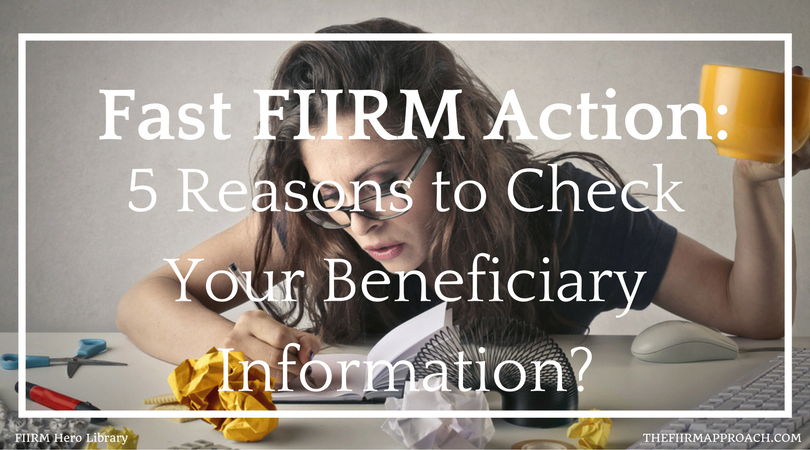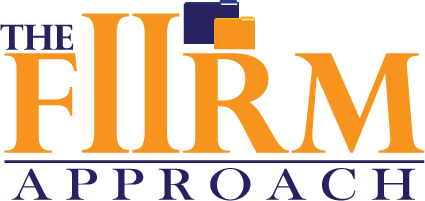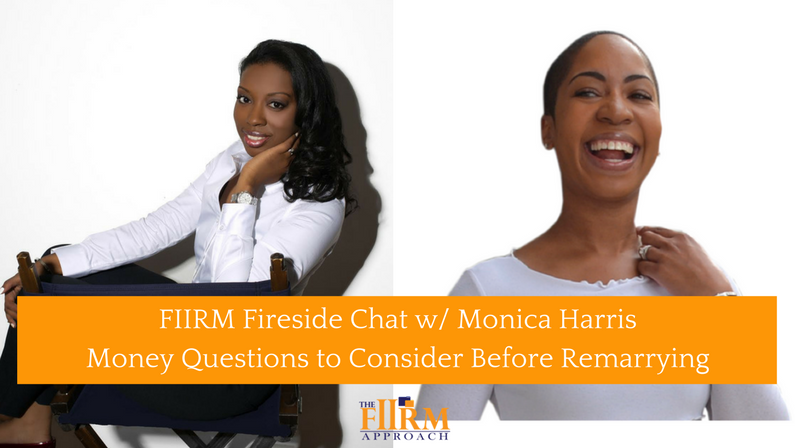[Video Transcript]
The FIIRM Approach Fireside Chat with Nikki Tucker and Monica Harris
Nikki: Hello! This is Nikki Tucker, the managing director and founder of The FIIRM Approach. Tonight, we are having a lovely fireside chat, talking about a couple of different things. The main thing is a recent blog article that I wrote, titled “What if She Gets Your Money.” Tonight, we are talking about beneficiaries and beneficiaries gone wrong, particularly for one segment of the population. We will figure out where the conversation goes, because I will not be alone. I have the pleasure and privilege of speaking with my resident expert, Monica Harris, and she is going to give you her perspective and insight because she is an expert! I want to welcome Monica Harris to the fireside chat tonight. Monica, I will give you the opportunity so you can tell the audience about who you are, what you do, and why they should listen to you.
Monica: Hi, everyone! I am Monica Harris. I am the chief advisor with Efficient Estates Financial Services. Nikki, thank you so much for having me this evening. In terms of why you should listen to me, I have a little bit of experience in this space. I’ve served in the financial services industry for about 18 years. My experiences range from retail banking, cash management, investing in stocks, investing in small businesses, to designing real estate transactions. I’ve done just a little bit of everything (outside of commercial) in financial services that there is to do. Most recently, I entered the insurance industry in 2006. Since 2012, I have had a specialized niche of designing annuity and life insurance strategies. I have clients who have navigated this journey with me for nearly 10 years. My most notable success story came from a woman who prematurely and improperly withdrew money from her employer provided defer compensation plan. It almost cost her well over $40,000. We were able to advise her accountant on how to completely eliminate that disaster. So, we know a little something about this stuff.
Nikki: Wow, well that’s awesome. I think you know more than a little, and that’s definitely why you are a part of the chat tonight. I am going to just give a quick and dirty rundown of the blog post for those that haven’t have an opportunity to see it. Then, we’ll dive in because you and I obviously know about it already. Again, the blog post is titled, “What if She Gets Your Money.” Essentially, there are situations that happen, maybe more often than I would hope for – I’m sure Monica would attest and agree to it than she would hope for – where sometimes you make a lot of decisions about your financial affairs. You are trying to get everything in order. You feel like you have. Then, there’s one thing, one stone that you left unturned, and things don’t go the way you intended them to. In this particular blog post, I was discussing the situation where there was a married couple. It was a second marriage, and one of the life insurance policies had the beneficiary listed as the ex-wife. A tragic accident occurred, and so on and so forth. My question for you, Monica, is if you were reading this story, if you had a client with a situation like this, what type of conversation would you have upfront with Vicki?
Monica: Up front, meaning, before she entered the marriage?
Nikki: Yes, before she entered the marriage.
We’re trying to influence our lovely friends and family to be proactive and not reactive.
Before she gets hitched for the second time, and is madly in love and blinded by love.
Monica: Right, and I know so much about that one. Like right as I was reading the blog, I was like “Oh my gosh, did she just name Monica, Vicki?”
I am first going to ask her about her daughter’s well-being, her daughter’s father and his influence, and whether or not he is in the picture. The reason that I want to know that is because I want her to consider positioning her assets that she already has and that she’s bringing into the marriage, at least considering, whether or not she wants those assets to remain attached to her daughter. Because once she’s married, depending on what state she is in (the majority of states I believe), once you are married, if something happens to you, even with some beneficiary arrangement, your spouse is kind of entitled to making decisions at the very least.
In advance of getting married, with a child from a previous relationship, I would first ask, “Are you comfortable with, are your affairs solidified for your child’s inheritance?” If your child, Tara, is a minor, you realize if something happens to you while she is still a minor, that depending on how you have your affairs documented, an estate could be set up for her with her legal guardian having control over that estate.
Are you comfortable with your ex (or whoever that person would be) managing her financial affairs?
Number One: Are things situated? Do you want things to remain exclusively for her, as opposed to getting tied up in the marital property?
Number Two: If you are going to try to segregate your pre-marital assets from the marriage, are you comfortable with the possibility of predeceasing your daughter while she’s a minor, and whomever her legal guardian is, ending up being the executor of that estate and ultimately having control over how it is dispersed? I just want to get her thinking about things like that.
Number Three: Do you have any additional assets that you’d like to acquire for your minor child or your pre-marital estate before you get married? If she is in a financial position to do so, there might be some things you want to talk to an estate planning attorney about, or an accountant about, in terms of how do I acquire those assets before the big day? How do they have to be documented? Is it meaningful?
Are there some things you want that he can’t touch? If so, let’s start working on a timeline to acquire those things and to acquire them efficiently.
Those are just some main things that I could think of, immediately. Ultimately, though, me not being an estate planning attorney, and depending on how she would have answered those questions, I would want to bring one in. Let’s get with an estate planning attorney because I am not going to be able to tell her how those documents need to be, how those assets need to be titled, and so forth and so on.
I would be curious to know what type of conversations her and Chris, the fiance, have had about their financial compatibility. What habits of his has she observed? What are her likes, her dislikes? Can she handle it? Because that is very important, especially when you come into a marriage with something. Does he come with any baggage, financial illiteracy, etc? I don’t want to go too far because I don’t know how much of the blog you are going to talk about, but there are some other things in there, too.
Nikki: I’ll make sure I give you an opportunity to touch on those, even if I don’t. I think you hit on a few key things and it is important for us to have a real conversation and to be transparent. I think your last point or I KNOW your last point is really valid about having a conversation – a real conversation – with the person you plan to spend the rest of your life with. Whether it’s your first marriage, second marriage, third marriage, that doesn’t really matter. From conversations I have had either with girlfriends or with clients, there’s a hesitation around wanting to talk about these items. They seem sensitive, or like you might end up in a fight and you might end up not walking down the aisle. You are not going to risk that! But that’s just my perspective on why people are apprehensive to have those real tough financial conversations. Do you have any experience or insight into why people may or may not be comfortable doing it? And why they should get over that?
Monica: I think you nailed the first one. It’s like what have I to fear? You know, that fear of the unknown. Am I really gonna kick this off and possibly not get my big day or something?
I was going to say I’ve been recently married, but it’s been five years. That’s still new, though. Coming into my second marriage and a blended family, I was completely disinterested in the big day. I was more so interested in the financial papers. That’s not normal! I think most people are so caught up… No, most people I think just don’t regularly nurture their financial situations as individuals, as single people. To even think about it as a factor, prior to getting married, unless they are dealing with a marriage counselor that has that as a component in their program, they are probably not even thinking about it.
Some of these possibilities are not at the forefront. They aren’t even IN their minds let alone at the forefront of their minds. But most often, I believe that as you stated in the blog, your day to day life takes over. I am really rare. I’m the person who is actually going to schedule time on my calendar to do my total financial picture. I need to see what it looks like 2 to 3 times a month.
That’s not common. Who has time for that? Referring back to the blog post, she already has a child. I am sure the child has commitments and extracurricular activities. She’s younger, and she’s planning a wedding. Who has time to think about, “Hmm, oh I wonder who the beneficiary is on his 401k, and I’m going to have to update my…” Really? That’s just you and me.
Nikki: No, we are definitely on an island all by ourselves. I think that we are both committed to bringing other women (women in particular, but other people) onto that island because it is so important to be there. You don’t have to be obsessive, the way you and I are, where we are checking our financial picture on a daily to weekly basis just cause that’s my thing.
At the same time, you can’t completely push it to the side because you may end up in a situation where what you thought was coming to you, in the event that something tragic and unexpected happens, is not coming to you because you did not take the time to take care of your business.
That’s the bottom line, and it’s a hard truth for some people. Like you said, they are busy with life. They don’t want to hear about it, even for those that have done some work on the estate planning side. Just because you have a will, doesn’t mean you get to ignore your beneficiary information. In most situations, what you put down on those forms trumps what is in your will. Most people don’t know that. Most people are not going to care until it matters, and when it matters it is going to be too late.
I don’t want to keep you. I know we said we would keep the Fireside Chats relatively quick, making sure people are getting enough information where they walk away with a little something. The last thing that I would ask, maybe has two parts. One – Is there anything that stuck out to you in the blog that you want to make sure you touch on before I let you go? Two – Any quick tips or pointers as far as things that women should really be mindful of and making sure they pay attention to, whether they are doing it on their own, or whether they are working with professionals like us? What should people be doing?
Monica: Immediately following viewing this video, everyone should take a look at their beneficiary arrangements. You’ve talked about wills, so hopefully, everyone is very clear on the fact that that is literally just a list of everything that you have and who you would like to have it. Take a look at your beneficiary arrangements. Make sure they are current. I think that life events are very important if there is a recent job change, a death in the family, a new baby, a marriage, an adoption, or even if someone, some extended relative passed on with assets. There’s a lot of opportunity in all of that stuff. It can either result in positive opportunities for building wealth, or disasters. Take an assessment, and build into your calendars. If you’re not building into your calendars, it might not happen, right? It might not happen religiously, but if you put it in there as a recurring event, monthly or quarterly, at some point I think that you will adopt it.
Nikki: I need you to repeat that one more time because most people will ignore that. Say it again just to make sure that they get it.
Monica: Sit down. Look at your calendar, and see what really is most important. If your calendar looks like mine, where it’s color-coded and there’s no white space ever, I still find things where it’s like, “If I’m prioritizing, I can move that back. I’ve got to do this.” I’ve got to do this because we don’t get to make an appointment for life events (most of them). Designating time into your schedule (even if it’s not until the end of March), at least get it on the calendar to review what you have in your bank account, on your life insurance, on your retirement plan, and in terms of your home, your property. That’s a whole other ball game!
Participate in all of the educational forums that we’re going to be hosting. Make it not too stiff, where we will have an attorney there and when you are going to these events, don’t just show up! Designate some time in your calendar before the event to write down your questions. Make sure you ask them because most attorneys charge to just sit down and answer those preliminary questions. When you go to these workshops and these webinars, you get to ask questions for free! Jot down your questions, bring them with you, and ask them. That’s what I would encourage people to do. Just recognizing that when you decide to make these huge life changes, and when you don’t decide to. Some of the life events that I neglected to mention, where even when you get laid off or you switch jobs, that is a time to sit down. When it happens, you can’t sit down right away, right? But when you know that something has happened or you know it’s going to happen, you go straight to your calendar. Build in that time!
Nikki: Those are really great summary points, and I’m going to repeat them one more time. I don’t think that we can beat our friends and our family, and even those that we don’t know that end up seeing this video, enough about those points. If I’m summarizing incorrectly, you can beat me up about it, just let me know like, “Nikki, you missed a point!” Ultimately, we need people to be proactive and be committed to it. You can be committed to getting your financial affairs in order, specifically reviewing your beneficiary information at this point, by putting it on your calendar. You figure out the frequency that works for you, and what makes sense. Maybe you miss a day or two because life gets in the way, but you keep it as a recurring event on your calendar so that you eventually will get to it. You’ll stop canceling on yourself.
Two, if there’s an opportunity to get information, whether it’s live, in person, or even online and stuff like this, be prepared. Ask questions, especially because you have access to free expert advice. Take advantage of the situation. There are things that may come out of those events that are helpful. One, attend them, especially if they have wine or food, and two, don’t just show up and be silent. Be present at the event. Be present, and again, proactive in your own life. It definitely can’t hurt. I can’t see a situation where you walk away pissed because you’ve asked a question.
Thank you for the awesome chat Monica! I really appreciate your input and your expertise.
Has this post inspired you to make sure that all your financial ducks are in a row? Take another step in the right direction and dive right in! See what other female breadwinners are using to manage their money, save more, earn more and save time. Grab your free copy of the FIIRM Ultimate Financial Resource Guide today.
Monica can be found providing value in her Facebook Group Money Chats. You can find out more about her and her company Efficient Estates, here.




Recent Comments